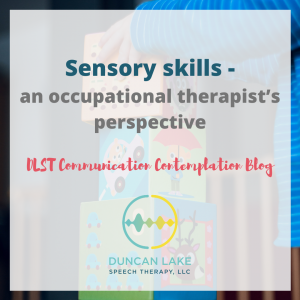I mentioned briefly on the Facebook page this week that sensory skills are extremely important, especially when it comes to language development. Our occupational therapist friends are the true experts in this area, so for this week’s blog entry, I brought in a PRO!
Friends, we’re so lucky to have Brooke Camp, occupational therapist (OT) with Van Buren Intermediate School District, here to answer some questions about OTs, sensory skills, and how parents can build their kiddo’s sensory development!

Can you tell us what pediatric OTs do?
Occupational therapists address “occupational performance” in a variety of ages, stages and environments. As pediatric OTs, we specifically address children’s occupational performance which includes, but is not limited to the following: developmental fine motor/visual motor and sensorimotor skills, sensory processing, ocular motor skills & vision, play, and all activities of daily living (including dressing, toileting, feeding & self care). Our goal is always to increase independence & function. We really are a jack-of-all-trades. We have the BEST job in the world because we essentially get to play with kids every day!
Tami’s Note: They truly have the best toys and the best activities! ZIP LINES? BALL PITS? I mean, come on.
What is sensory processing and why is it so important?
Sensory processing is the body’s ability to process and organize sensation from the environment (as well as internally – interoception) – thus making it possible to use the body effectively within the environment. When there is a hiccup or disruption in our body’s ability to process our senses, this can lead to an array of difficulties and/or delays – thus impacting our functional performance and daily living. To a degree, we all have sensory processing difficulties – for instance, some of us like bright light, where others prefer dim; smells bother people and can trigger emotional responses; the texture of certain clothing may be enough to send a person an uncomfortable feeling, leaving them unable to focus on the task at hand; temperatures can keep people inattentive and uncomfortable. There are many degrees of sensory processing – the key to knowing whether it is a disorder or not is how it is impacting a person’s functional performance.
What happens when a kiddo’s sensory system is dysregulated or delayed in development?
When a child’s sensory system is dysregulated, it can lead to a host of problems: inattention, irritability,intolerance, high pain tolerance, fidgeting, lack of coordination, over-responsivity, under-responsivity, problems with transitions & change, poor body awareness and so much more. To put it into perspective: think of a time when you are working tirelessly on a deadline (requiring massive concentration), the radio is blaring, your family is talking to you and asking questions that require responses, dinner is cooking in the oven, and you may or may not be exhausted……it would be enough to throw you over the edge and perhaps want to scream….right?!?! Interference in self-regulation can be disastrous – to all people, but especially to children, when they do not understand how to communicate what they are feeling (often times resulting in a what looks to be poor behavior); in addition, children begin to learn coping and soothing strategies at a very young age (think a newborn’s cry to be fed, or cuddled, or picked up, or rocked; the soothing reassurance from a tender hug; sunglasses when it is too bright) – so when the sensory system is not performing optimally, the results can have a serious impact.
How can sensory skill development help aid language development?
Sensory exploration stimulates all of the senses at the same time: tactile, auditory, visual, gustatory, olfactory, vestibular and proprioception. All of these senses together boost the overall development in children. Using a variety of senses all at once allows a child to develop language, cognitive, motor, social and imaginative skills. Sensory explorations have a huge impact on language and communication domains of child development and they are generally FUN! When a child indulges in sensory play – it is easier to engage children in any language enrichment activity!
Can you give parents any tips for helping their kiddos with sensory skill development?
PLAY. Period. Play with kiddos: in the water, in the mud, in the bath, in finger paint, in food, in shaving cream,with soap, with bubbles, with playdough, .
PLAY. Play outside: walk in the grass with bare feet, walk on the beach in the sand, sit down in a sandbox, walk on uneven surfaces, play on a playground, bounce a ball, play catch, kick a ball, swing, spin, push-pull, tumble. Walk, run, sit, scoot, skip, climb, log roll, twirl. Give kiddos the movement experiences that they crave!
PLAY. Play games while laying on your TUMMY: play a board game, play make believe, play legos, play dollies, look at books, color.
The sky’s the limit! Children LOVE adult attention – so give it to them in a positive, interactive, motor-based way…because every interaction is an opportunity to learn.
—————
Brooke Camp, OTR/L, is a 15-year veteran occupational therapist and a busy mom of 3. She currently works for the Van Buren Intermediate School District, where she provides services to students aged 3-18 and designs very fun sensory rooms. SHE LOVES HER JOB!



Recent Comments